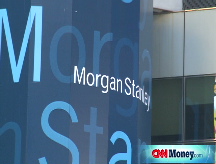Asian stocks rise on Fed rate cut
Nikkei, Hang Seng take cues from Wall Street, finish session in positive territory.
(CNN) -- Asian markets rose Wednesday, piggybacking on the Wall Street surge that was fueled by a cut in a key short-term interest rate by the U.S. Federal Reserve.
Tokyo's Nikkei average ended with modest gains. Seoul's KOSPI index was trading in a narrow range. In Australia, the All Ordinaries index was a quarter percent higher, while Hong Kong's Hang Seng had picked up 0.4%.
Stocks soared on Wall Street on Tuesday after the Fed knocked a key short-term interest rate to the lowest level on record and signaled it had more tools available to help the economy as the recession stretches on.
The Dow Jones industrial average added 359 points, or 4.2%, to end at 8,924. The Standard & Poor's 500 index rose 5.1% and the Nasdaq composite gained 5.4%.
The central bank opted to lower the federal funds rate to a targeted range of between zero and 0.25%. That's the lowest level on record, going back to 1954. The rate stood at 1% previously. Economists thought the Fed would lower the rate to 0.5% or possibly 0.25%.
Stocks had been up modestly ahead of the 2:15 p.m. ET announcement, but surged right after.
"I think the Fed was virtually out of ammunition on the target side, so even this little move of setting a range was better than what people were expecting," said Jack Ablin, chief investment officer at Harris Private Bank.
Ablin said that stocks were rallying after the announcement on both the surprise element and the realization that the Fed is willing to do whatever it takes to battle deflation and get the economy "off the mat."
In its closely watched statement, the bank said the economic outlook has worsened amid a deteriorating labor market and weaker consumer spending and business investment. The bank also said inflationary pressures have waned.
"I think they are acknowledging that their attempt to restart economic growth has only been partly effective and that at its current point, the recession is deeper than what they had anticipated," said Gregory Miller, chief economist at SunTrust Banks.
The Federal Reserve has cut rates since September 2007 in an attempt to thwart the economic slowdown. But the economy has actually worsened. The United States has been in a recession since December 2007 and is expected to remain in one through next year.
The Fed has also taken a number of unusual steps this year in its efforts to thaw the credit freeze and get banks to start lending to each other and consumers again.
But the lowering of rates and the flooding of the market with money hasn't helped with the "transmission of liquidity," Miller said, as banks have been unwilling to loan out most of what they've received.
Housing starts and building permits fell to record lows in November, the latest sign that the market has not yet reached bottom. Housing starts plunged more than 15% to an annual rate of 616,000 in November, the Commerce Department reported, while building permits slipped to an annual rate of 616,000. Both results were worse than what economists surveyed by Briefing.com had expected. ![]()


